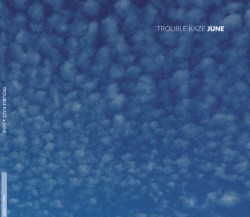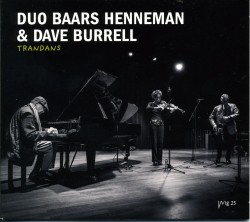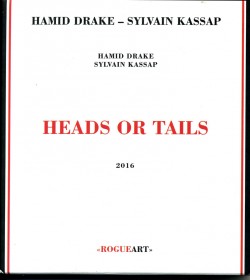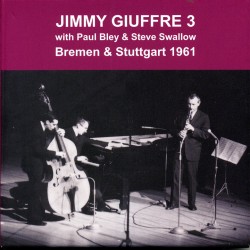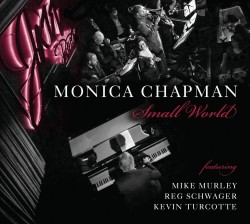Although the keyboard may challenge it for top spot, the guitar may be the most popular musical instrument in the world. Think of any genre from pop to so-called classical and there’s a six-string player associated with it. Especially when electrified, the guitar’s adaptability gives it this popularity, and nowhere is this more evident than in improvised music. These five guitarists, matched with musicians playing five different instruments, demonstrate this.
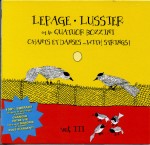 Cheating a bit, Québécois guitarist René Lussier and clarinetist Robert Marcel Lepage have the backing of Quatuor Bozzini on some selections of Chants et Danses…with Strings! (Tour de Bras TDB 900019 CD tourdebras.com), but all the strings do is create backgrounds from which Lepage and Lussier’s sounds rise like the contours of a raised-relief map. Wedded to folk and blues, Lussier makes use of long-lined strumming or curt bottleneck-like phrasing to make his point on tracks such as Comment faire de l’argent avec une clarinette where Lepage’s riposte varies from Morse code-like bites to trills. On Le sextour hors position, any strings-added romantic inferences are quickly swept aside by catgut flanges and buzzing reed vibrations, with the guitarist outputting countrified mandolin-like twangs from his instrument and the clarinetist specializing in an unvarying flat-line solo. With Chants et Danses’ 13 tracks specific to its time and place, the tunes which most clearly highlight the duo’s individuality and societal concerns are those such as Vers un capitalisme à visage humain, which works string whacking and reed bites into a jazz-like call and response; or Comment garder le feu sacré sans brûler son capital, where a near light-music introduction is subverted by multiphonic bedlam with the clarinet horking and snuffling like an elderly man with asthma and Lussier’s heightened string rubs sounding as though created by sandpaper instead of fingers. The sonic narrative on track ten, whose 18-word title begins with Comment remettre l’éthique en politique… sums up the duo’s interaction most succulently, politically and meaningfully. While Lussier’s bottle-neck whines may upset the exposition, Lepage’s moderato lines ensure the track is as buoyant as it is discordant.
Cheating a bit, Québécois guitarist René Lussier and clarinetist Robert Marcel Lepage have the backing of Quatuor Bozzini on some selections of Chants et Danses…with Strings! (Tour de Bras TDB 900019 CD tourdebras.com), but all the strings do is create backgrounds from which Lepage and Lussier’s sounds rise like the contours of a raised-relief map. Wedded to folk and blues, Lussier makes use of long-lined strumming or curt bottleneck-like phrasing to make his point on tracks such as Comment faire de l’argent avec une clarinette where Lepage’s riposte varies from Morse code-like bites to trills. On Le sextour hors position, any strings-added romantic inferences are quickly swept aside by catgut flanges and buzzing reed vibrations, with the guitarist outputting countrified mandolin-like twangs from his instrument and the clarinetist specializing in an unvarying flat-line solo. With Chants et Danses’ 13 tracks specific to its time and place, the tunes which most clearly highlight the duo’s individuality and societal concerns are those such as Vers un capitalisme à visage humain, which works string whacking and reed bites into a jazz-like call and response; or Comment garder le feu sacré sans brûler son capital, where a near light-music introduction is subverted by multiphonic bedlam with the clarinet horking and snuffling like an elderly man with asthma and Lussier’s heightened string rubs sounding as though created by sandpaper instead of fingers. The sonic narrative on track ten, whose 18-word title begins with Comment remettre l’éthique en politique… sums up the duo’s interaction most succulently, politically and meaningfully. While Lussier’s bottle-neck whines may upset the exposition, Lepage’s moderato lines ensure the track is as buoyant as it is discordant.
 In a divergent relationship with a horn and the guitar are two Köln-based improvisers, trombonist Matthias Muche and guitarist Nicola L. Hein, whose five extended improvisations on 7000 Eichen (JazzWerkstatt JW171 jazzwerkstatt.eu) are dedicated to German sculptor, installation and performance artist Joseph Beuys (1921-1986). Only as programmatic as Chants et Danses, the duets here are more representational in title than application. However, Beuys’ Fluxus-affiliated disdain for convention could have influenced them. Like sculptures that reveal antithetical aspects when viewed from different angles, Muche and Hein are more interested in what seemingly non-brass-like and non-string-like timbres their instruments can produce, rather than conventional tones. This is where the guitar’s adaptability is exhibited. Throughout, using thumb pops, hand taps and slurred fingering, Hein’s rhythmic accompaniment could be from percussion, instead of from a stringed instrument. As on the introductory Stahlwille, though, he can still take a shrill undulating solo with the crunch of Johnny Ramone and the tautness of Sonny Sharrock. As for Muche, like any auto racer, he’s unafraid of speed, buzzing out one set of arpeggiated notes after another. Not only does he bend grace notes with brassy adroitness, but on tracks such as Zwitschern he digs deep into the instrument’s bottom range. At the same time, his relay-race-like concept ranges from staccato to slur, as if he’s manipulating two trombones; this is showcased best on Dick Vermummt. 7000 Eichen’s defining track is the last: Künstlerhaus II. The architectural plans for this “second artist’s house” gives the duo almost 15 minutes to cogitate. Over a backdrop of patterning from Hein as pervasive as the sound of a hamster’s wheel, Muche outputs crying, plunger and burbling tremors which intensify as the piece evolves. Reaching a climax when ringing flanges and strums from Hein match Muche’s emotional release in the track’s penultimate minutes, a detour into a grotesque variant on Taps leads to one perfect growly note which both output simultaneously, as if reaching mutual euphoric satisfaction.
In a divergent relationship with a horn and the guitar are two Köln-based improvisers, trombonist Matthias Muche and guitarist Nicola L. Hein, whose five extended improvisations on 7000 Eichen (JazzWerkstatt JW171 jazzwerkstatt.eu) are dedicated to German sculptor, installation and performance artist Joseph Beuys (1921-1986). Only as programmatic as Chants et Danses, the duets here are more representational in title than application. However, Beuys’ Fluxus-affiliated disdain for convention could have influenced them. Like sculptures that reveal antithetical aspects when viewed from different angles, Muche and Hein are more interested in what seemingly non-brass-like and non-string-like timbres their instruments can produce, rather than conventional tones. This is where the guitar’s adaptability is exhibited. Throughout, using thumb pops, hand taps and slurred fingering, Hein’s rhythmic accompaniment could be from percussion, instead of from a stringed instrument. As on the introductory Stahlwille, though, he can still take a shrill undulating solo with the crunch of Johnny Ramone and the tautness of Sonny Sharrock. As for Muche, like any auto racer, he’s unafraid of speed, buzzing out one set of arpeggiated notes after another. Not only does he bend grace notes with brassy adroitness, but on tracks such as Zwitschern he digs deep into the instrument’s bottom range. At the same time, his relay-race-like concept ranges from staccato to slur, as if he’s manipulating two trombones; this is showcased best on Dick Vermummt. 7000 Eichen’s defining track is the last: Künstlerhaus II. The architectural plans for this “second artist’s house” gives the duo almost 15 minutes to cogitate. Over a backdrop of patterning from Hein as pervasive as the sound of a hamster’s wheel, Muche outputs crying, plunger and burbling tremors which intensify as the piece evolves. Reaching a climax when ringing flanges and strums from Hein match Muche’s emotional release in the track’s penultimate minutes, a detour into a grotesque variant on Taps leads to one perfect growly note which both output simultaneously, as if reaching mutual euphoric satisfaction.
 Euphoria is the main attribute you ascribe to Noise from the Neighbours (Setola di Maiale SM3160 setoladimaiale.net), with the performance more concerned with fun than ferocity. Still, Italian guitarist Enzo Rocco and tenor and baritone saxophonist/bass clarinetist Carlo Actis Dato are sophisticated comedians, never letting guffaws get in the way of musical excellence. With their frenetic string chording, fluid reed vibrations and overblowing, plus frantic melodies, they could be court jesters, but like those clowns they also speak the truth. That’s why a series of tarantella-like tracks are followed by Briciole, where bent plucks from Rocco and rugged honks from Dato add up to an Italian blues. This transition from silly to serious and back again permeates the album, reaching its zenith on the extended Kumano. As the saxophonist bellows a low-pitched continuum, the guitarist contorts his string technique to sound like a sitar or a banjo. Later adding a blues sensibility, the two are like halves of a walnut, keeping the rhythm going as Rocco scrapes at his strings and Dato blows animated air every which way. The following La Ronda del Visconte has a jolly, circular and instantly memorable melody. This convivial noise goes on for all 12 tracks, ending with Rumbabamba confirming the duo’s smarts. It begins low-key and cool and ends with pointed rasgueado strums, plus tongue slaps and guffaws from the reedist.
Euphoria is the main attribute you ascribe to Noise from the Neighbours (Setola di Maiale SM3160 setoladimaiale.net), with the performance more concerned with fun than ferocity. Still, Italian guitarist Enzo Rocco and tenor and baritone saxophonist/bass clarinetist Carlo Actis Dato are sophisticated comedians, never letting guffaws get in the way of musical excellence. With their frenetic string chording, fluid reed vibrations and overblowing, plus frantic melodies, they could be court jesters, but like those clowns they also speak the truth. That’s why a series of tarantella-like tracks are followed by Briciole, where bent plucks from Rocco and rugged honks from Dato add up to an Italian blues. This transition from silly to serious and back again permeates the album, reaching its zenith on the extended Kumano. As the saxophonist bellows a low-pitched continuum, the guitarist contorts his string technique to sound like a sitar or a banjo. Later adding a blues sensibility, the two are like halves of a walnut, keeping the rhythm going as Rocco scrapes at his strings and Dato blows animated air every which way. The following La Ronda del Visconte has a jolly, circular and instantly memorable melody. This convivial noise goes on for all 12 tracks, ending with Rumbabamba confirming the duo’s smarts. It begins low-key and cool and ends with pointed rasgueado strums, plus tongue slaps and guffaws from the reedist.
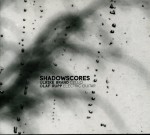 More pointed and stinging is Shadowscores (Creative Sources CS 368 CD creativesourcesrec.com), since Berlin-based guitarist Olaf Rupp and cellist Ulrike Brand’s improvisations emphasize harsher interactions. Despite supposed limitations in tone, the two, like scientists who discover a new compound by ignoring convention, come up with a series of multi-sectional works whose performance minimizes electronic and acoustic property as well as the gap between foreground and background. A track such as Moorkolk, where Brand sequences parts that could have come from a multi-cello sonata and Rupp scratches and scampers with withdrawn pressure, proves the duo’s capability to improvise at the slowest possible tempo, while tracks such as Labeling Approach and Quellmoor demonstrate the exact opposite. Soon after Brand’s Paganini-styled spiccato creates a vivid exposition on the first tune, Rupp’s knob-twisting reveals a thumping ostinato that resembles cymbal crashes. Off-handed picking and string buzzing from the cellist is lubricated by rubs and tugs by the guitarist, leading to rugged below-the-bridge responses from Brand and, eventually, multiphonic flanges from Rupp. (All this while maintaining the theme on top of the cellist’s shifting continuum.) Any of Brand’s attempts at long-string romanticism on Quellmoor are quickly subverted by rocket-like interjections from Rupp. Moving forward and back like square dancers, the two continuously change places, with scrubs and plucks from Brand meeting string twangs or barks from Rupp. Rupp sneaks in the odd rock riff, and Brand adds some passages that would be elegant if not so high-pitched and strained. Chamber music with a difference, these improvisations show what conventional instruments are capable of when utilized to their limits.
More pointed and stinging is Shadowscores (Creative Sources CS 368 CD creativesourcesrec.com), since Berlin-based guitarist Olaf Rupp and cellist Ulrike Brand’s improvisations emphasize harsher interactions. Despite supposed limitations in tone, the two, like scientists who discover a new compound by ignoring convention, come up with a series of multi-sectional works whose performance minimizes electronic and acoustic property as well as the gap between foreground and background. A track such as Moorkolk, where Brand sequences parts that could have come from a multi-cello sonata and Rupp scratches and scampers with withdrawn pressure, proves the duo’s capability to improvise at the slowest possible tempo, while tracks such as Labeling Approach and Quellmoor demonstrate the exact opposite. Soon after Brand’s Paganini-styled spiccato creates a vivid exposition on the first tune, Rupp’s knob-twisting reveals a thumping ostinato that resembles cymbal crashes. Off-handed picking and string buzzing from the cellist is lubricated by rubs and tugs by the guitarist, leading to rugged below-the-bridge responses from Brand and, eventually, multiphonic flanges from Rupp. (All this while maintaining the theme on top of the cellist’s shifting continuum.) Any of Brand’s attempts at long-string romanticism on Quellmoor are quickly subverted by rocket-like interjections from Rupp. Moving forward and back like square dancers, the two continuously change places, with scrubs and plucks from Brand meeting string twangs or barks from Rupp. Rupp sneaks in the odd rock riff, and Brand adds some passages that would be elegant if not so high-pitched and strained. Chamber music with a difference, these improvisations show what conventional instruments are capable of when utilized to their limits.
 The story is similar with Kontaktchemie (Boomslang LC 09496 traps.at), as Swiss guitarist Christy Doran and Belgian drummer Alfred Vogel demonstrate the versatility of common jazz or rock music configurations. Of course, their setup is less than traditional since Doran also uses an FX box, whose sound-card input adds effects, while Vogel has a double drum set and an electronic Octopad with patches allowing for sound triggering, modulation and pitch blending. Throughout it appears as if the two spend time deciding whether their function is outputting the most hushed free music or the most grandiose jazz-rock. But while tracks are sometimes noisy, heavy-metal head-bangers will be disappointed. The changes appear Janus-like on most tracks. Fremdeinwirkung begins with slippery moves up the guitar neck, followed by drumming clanks and clatter, which eventually turn into faster cascades joined by flying flanges and intimation of an electric bass line. The key track in this style is Das Gelbe vom Ei, where a feeling of late-night summer silence is interrupted first by percussion clanks, detailed guitar theme exposition and finally a moderated drum backbeat - the perfect verdant backing for string storytelling. With spacey sounds available from the add-ons, which often take the form of organ-like patterning, Kontaktchemie actually comes across as the most traditional of these discs, since psychedelia is now part of the tradition. Aus Zwei wird Eins, the final track, even includes a throwback-to-the-sixties sonic jape. After four minutes of guitar rasps and drum shuffles accelerating to a freak-out climax, ten minutes of silence follow, then suddenly an additional nine minutes of free form improvising becomes audible with buttery slides and drones from Doran, plus crackles and clips forged into a steady beat by Vogel. That track title translates as “From Two Will Be One.” On evidence of the complementary creativity on all these discs, it could be applied to any session here.
The story is similar with Kontaktchemie (Boomslang LC 09496 traps.at), as Swiss guitarist Christy Doran and Belgian drummer Alfred Vogel demonstrate the versatility of common jazz or rock music configurations. Of course, their setup is less than traditional since Doran also uses an FX box, whose sound-card input adds effects, while Vogel has a double drum set and an electronic Octopad with patches allowing for sound triggering, modulation and pitch blending. Throughout it appears as if the two spend time deciding whether their function is outputting the most hushed free music or the most grandiose jazz-rock. But while tracks are sometimes noisy, heavy-metal head-bangers will be disappointed. The changes appear Janus-like on most tracks. Fremdeinwirkung begins with slippery moves up the guitar neck, followed by drumming clanks and clatter, which eventually turn into faster cascades joined by flying flanges and intimation of an electric bass line. The key track in this style is Das Gelbe vom Ei, where a feeling of late-night summer silence is interrupted first by percussion clanks, detailed guitar theme exposition and finally a moderated drum backbeat - the perfect verdant backing for string storytelling. With spacey sounds available from the add-ons, which often take the form of organ-like patterning, Kontaktchemie actually comes across as the most traditional of these discs, since psychedelia is now part of the tradition. Aus Zwei wird Eins, the final track, even includes a throwback-to-the-sixties sonic jape. After four minutes of guitar rasps and drum shuffles accelerating to a freak-out climax, ten minutes of silence follow, then suddenly an additional nine minutes of free form improvising becomes audible with buttery slides and drones from Doran, plus crackles and clips forged into a steady beat by Vogel. That track title translates as “From Two Will Be One.” On evidence of the complementary creativity on all these discs, it could be applied to any session here.
 Stir
Stir

